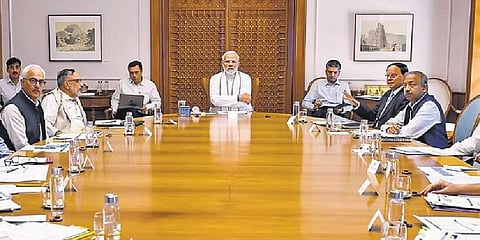

NEW DELHI: Prime Minister Narendra Modi on Monday chaired a high-level meeting with different ministries and agencies to review the country’s preparedness to deal with the hot weather conditions forecast by India Meteorological Department (IMD).
The IMD forecast for the next few months has stated that the maximum and the minimum temperatures will be hovering above normal. The high temperature is likely result in health issues besides impacting the country’s food security.
The principal secretary to the PM, Cabinet secretary, home secretary and secretaries to Ministry of Health & Family Welfare, Ministry of Agriculture & Farmer Welfare, Ministry of Earth Sciences attended the meeting. Besides, Member Secretary, National Disaster Management Authority, participated in the meeting.
The IMD has forecast that this summer would be hotter than last year, especially in northern India. North India will not get any relief from heat and heat waves in the coming months, it said. The above-the-normal maximum and minimum temperatures in the region may cause health hazards.
The country had witnessed the hottest February since 1901. The average maximum temperature across the country in February increased to 29.5°C; the fifth highest averaged minimum temperatures increased to 16.3 °C in the last 123 years, which alarmed the meteorologists. The forecast for the coming months (March to May) doesn’t give a positive outlook on the country’s food security and people’s health. Its impact is visible on all sorts of rabi crops in the field. This reporter spoke to farmers of different states and learned that the high temperature would impact animal fodder and productivity of their rabi crops, especially wheat, mustard, pulses and horticulture crops such as mangoes.
The Prime Minister has instructed that availability of fodder and of water in reservoirs should be tracked.
The Food Corporation of India has also been directed to ensure optimal storage of grains in extreme weather conditions. The Ministry of Health and Family Welfare (MoHFW) has advised the state governments to take appropriate action on health-related issues.
It directed the state government and Union Territories to conduct daily surveillance on heat-related illnesses under National Programme on Climate Change and Human Health (NPCCHH) from March 1.
Prime Minister Modi has emphasised on awareness programmes targeting different stakeholders, including citizens, medical professionals, municipal and panchayat authorities and disaster response teams like firefighters. He also asked IMD to issue daily weather forecasts in a manner which can be easily interpreted and disseminated. It would create awareness and allow citizens to take necessary precautions.